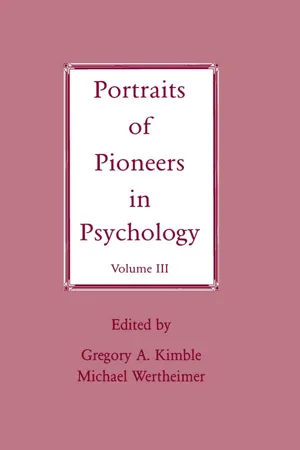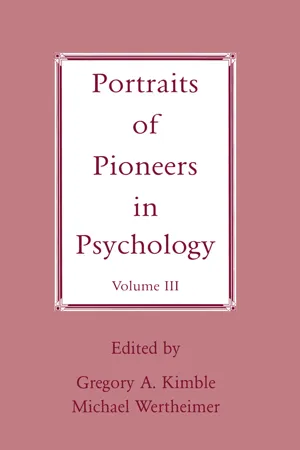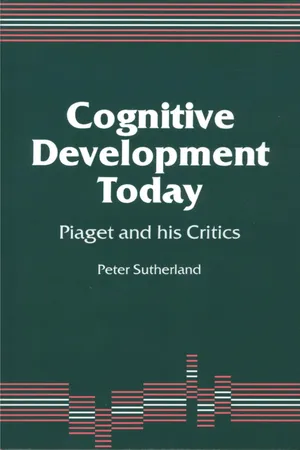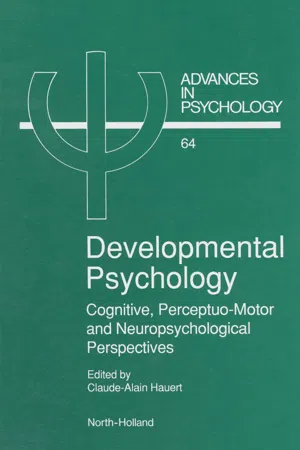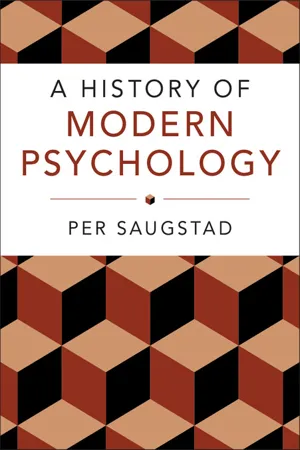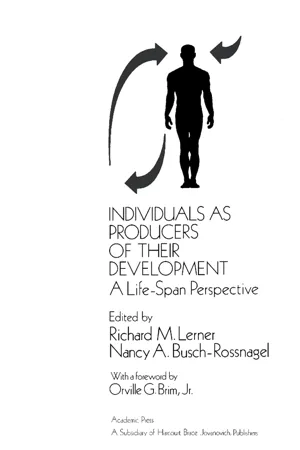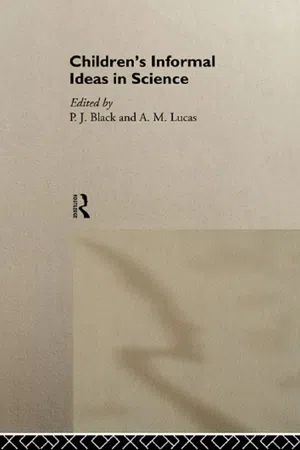Psychology
Jean Piaget
Jean Piaget was a Swiss psychologist known for his pioneering work in child development. He proposed a theory of cognitive development that emphasized the importance of children's active participation in learning and their ability to construct their understanding of the world. Piaget's stages of cognitive development, including sensorimotor, preoperational, concrete operational, and formal operational stages, have had a profound impact on the field of psychology.
Written by Perlego with AI-assistance
Related key terms
1 of 5
11 Key excerpts on "Jean Piaget"
- Wade Pickren, Donald A. Dewsbury, Michael Wertheimer, Wade Pickren, Donald A. Dewsbury, Michael Wertheimer(Authors)
- 2012(Publication Date)
- Psychology Press(Publisher)
6Jean Piaget:Theorist of the Child’s Mind
BERNARD C. BEINSIthaca CollegeJean Piaget (b. August 9, 1896, d. September 16, 1980) has had more influence on the study of cognitive development than any other psychologist. As soon as his first books appeared, psychologists recognized the fertility of his ideas, even though those ideas had to make a linguistic journey from French to English, a translatlantic journey from Switzerland to the United States, and a methodological journey from more philosophical to more psychological. Piaget’s theory of cognitive development continues to dominate developmental psychology over 80 years after its introduction.Figure 6.1 Jean Piaget. (Courtesy of the Jean Piaget Society. With permission.)Piaget’s background mirrored that of the earliest generation of psychologists in his combined focus on the natural sciences and philosophy. Piaget credited his early work in the natural sciences with keeping his focus scientific, but he also maintained a European flavor to his ideas with a greater attachment to philosophy and logic than was common among psychologists in English-speaking countries at the time.Even with the shared background, however, Piaget developed his ideas largely independently of mainstream experimental psychology of the 1920s, which was already being led by English-speaking, behaviorally oriented psychologists in the United States. Piaget’s empirical approach was called “clinical,” relying on small samples and attention to children’s verbal statements to provide insights into cognitive processes. This approach was at variance with American psychology in that the latter had moved away from the study of mental processes that featured so prominently in Piaget’s work. In addition, whereas Piaget tended to study small numbers of children, American psychology had moved toward studying groups, averaging out the effect of unusual behaviors that might have been of great interest to Piaget. The few structuralists of Edward Bradford Titchener’s bent who remained active in psychology in Piaget’s early years would not have studied children because of the children’s relatively limited verbal skills. Their inability to report their introspections would have ruled them out as experimental participants.- eBook - ePub
Portraits of Pioneers in Psychology
Volume III
- Gregory A. Kimble, Michael Wertheimer(Authors)
- 2014(Publication Date)
- Psychology Press(Publisher)
Chapter 9
Edward Zigler Elizabeth GilmanThe Legacy of Jean PiagetIt has frequently been asserted that no theoretical framework has had a greater impact on developmental psychology than that of Jean Piaget (Beilin & Pufall, 1992; Flavell, 1996). Using concepts from biology, psychology, philosophy, and mathematics to examine the manner in which children learn about the world, Piaget gave us a remarkably well-articulated and integrated theory of cognitive development. A highly productive worker, he published some 70 books and over 100 articles in psychology. Despite criticisms of the limitations and the lack of objectivity of Piaget’s methods (see e.g., Gopnik, 1996; Lourenco & Machado, 1996), our understanding of children’s intellectual development would never have evolved as it has without his pioneering efforts. Piaget’s theoretical formulations have stimulated a vast amount of research. This chapter, written in the year that marks the 100th anniversary of Piaget’s birth, provides an appropriate occasion for the celebration of his achievements and the deep and continuing influence of his work.PIAGET’S EARLY LIFE AND WORK
Jean Piaget was born in the Swiss university community of Neuchatel in 1896. His mother was intelligent and religious and his father was a historian with a special interest in medieval literature. Piaget took up serious scientific pursuits at a youthful age. He showed an early passion for observing nature and a precocious interest in biology and psychology (Brainerd, 1996; Evans, 1973). His interest in biology resulted in a publication when he was only 10 years old—an article describing a rare albino sparrow that he had seen in a local park. Shortly thereafter, he began assisting in the local natural history museum, where he helped classify its zoology collection. He began studying molluscs and published articles on them when he was still in his teens. As a result of these articles, Piaget was offered a curator’s position at the Geneva museum of natural history—one that he was forced to decline in order to finish school. He was 14 years old at the time. - No longer available |Learn more
Portraits of Pioneers in Psychology
Volume III
- Michael Wertheimer, Gregory A. Kimble(Authors)
- 2013(Publication Date)
- Psychology Press(Publisher)
Chapter 9 The Legacy of Jean Piaget Edward Zigler Elizabeth GilmanIt has frequently been asserted that no theoretical framework has had a greater impact on developmental psychology than that of Jean Piaget (Beilin & Pufall, 1992; Flavell, 1996). Using concepts from biology, psychology, philosophy, and mathematics to examine the manner in which children learn about the world, Piaget gave us a remarkably well-articulated and integrated theory of cognitive development. A highly productive worker, he published some 70 books and over 100 articles in psychology. Despite criticisms of the limitations and the lack of objectivity of Piaget’s methods (see e.g., Gopnik, 1996; Lourenco & Machado, 1996), our understanding of children’s intellectual development would never have evolved as it has without his pioneering efforts. Piaget’s theoretical formulations have stimulated a vast amount of research. This chapter, written in the year that marks the 100th anniversary of Piaget’s birth, provides an appropriate occasion for the celebration of his achievements and the deep and continuing influence of his work.Piaget’s Early Life and WorkJean Piaget was born in the Swiss university community of Neuchatel in 1896. His mother was intelligent and religious and his father was a historian with a special interest in medieval literature. Piaget took up serious scientific pursuits at a youthful age. He showed an early passion for observing nature and a precocious interest in biology and psychology (Brainerd, 1996; Evans, 1973). His interest in biology resulted in a publication when he was only 10 years old—an article describing a rare albino sparrow that he had seen in a local park. Shortly thereafter, he began assisting in the local natural history museum, where he helped classify its zoology collection. He began studying molluscs and published articles on them when he was still in his teens. As a result of these articles, Piaget was offered a curator’s position at the Geneva museum of natural history—one that he was forced to decline in order to finish school. He was 14 years old at the time. - eBook - PDF
Cognitive Development Today
Piaget and his Critics
- Peter A A Sutherland(Author)
- 1992(Publication Date)
- SAGE Publications Ltd(Publisher)
The overwhelming impact of his findings for primary and preschool education finally became clear. Until then Piaget himself had not been interested in educational matters but, during the last two decades of his long career, he responded to many 8 Cognitive Development Today prominent educationists (such as Bruner) who had been stimulated by his work and himself wrote on education (1970). His later life hence revolved around working out various aspects of his ideas at his Institute for Epis-temologica! Studies in Geneva right up until his death in 1980 at the age of 84. The stages of development What Piaget became most famous for was his claim that children passed through a series of stages of thinking that were qualitatively different from each other. In the first quarter of this century the prevailing view of children's cognitive activity was that it was the same as adult's cognitive activity, only less efficient. Just as a child's body was similar to an adult's only smaller, so was his mind. Since a baby could not speak, he could not possibly think. Piaget's notion that a baby thought and learnt in a radically different way from an adult was a revolutionary one. Likewise, Piaget proposed that a toddler - despite speaking a simplified version of the adult language - thinks and learns in a totally different way from an (educated) adult. This too was considered astounding at the time. Many of his contemporaries did not accept his concept of different ways of thinking. They maintained that, as a child grows to adulthood, there is only quanti-tative and not qualitative progress. Many cognitive developmentalists (such as the domain-specific school) have returned to this view, arguing that there is insufficient evidence to justify the idea of stages that operate in different domains. Growth in thinking, learning and development with age is purely quantitative. The controversy over whether stages in fact exist is discussed frequently in subsequent chapters. - eBook - PDF
Teacher Education and the Pursuit of Wisdom
A Practical Guide for Education Philosophy Courses
- Sean Steel(Author)
- 2018(Publication Date)
Jean Piaget, Constructivism, and Seeing the Child in Education C H A P T E R E L E V E N Core Reading Piaget, Jean. Chapter Five or Chapter Seven. In The Child’s Conception of the World. Trans- lated by J. Tomlinson and A. Tomlinson. Frogmore, St. Albans: Paladin, 1973. Recommended Reading Matthews, Gareth. B. Philosophy and the Young Child. Cambridge: Harvard University Press, 1980. Our Debt to Piaget in Education Jean Piaget lived from 1896 to 1980. He was a Swiss developmental psychologist, most famous for his work with children and his writings on cognitive develop- ment. He is also always associated with the trend in education known as “construc- tivism,” even though, as far as I know, Piaget never called himself a constructivist. Constructivism is the most prominent idea that underpins teacher education now- adays. Probably most of the professors and instructors who teach you in your BEd 278 | TEACHER EDUCATION AND THE PURSUIT OF WISDOM program, your graduate program, or who are involved in your professional devel- opment, are self-identified “constructivists.” So really, inasmuch as constructivism has its taproot in Piaget’s work, we certainly owe much of our own understanding today of schools, education, teaching, and learning, to Piaget. Jean Piaget took great efforts to try to see the children he was studying: to really see them, and to understand them. - No longer available |Learn more
- (Author)
- 2014(Publication Date)
- The English Press(Publisher)
________________________ WORLD TECHNOLOGIES ________________________ Chapter-2 Piaget's Theory of Cognitive Development Piaget's theory of cognitive development is a comprehensive theory about the nature and development of human intelligence first developed by Jean Piaget. It is primarily known as a developmental stage theory, but in fact, it deals with the nature of knowledge itself and how humans come gradually to acquire it, construct it, and use it. Moreover, Piaget claims the idea that cognitive development is at the centre of human organism and language is contingent on cognitive development. Below, there is first a short description of Piaget's views about the nature of intelligence and then a description of the stages through which it develops until maturity. The Nature of Intelligence: Operative and Figurative Intelligence Piaget believed that reality is a dynamic system of continuous change, and as such is defined in reference to the two conditions that define dynamic systems that change. Specifically, he argued that reality involves transformations and states. Transformations refer to all manners of changes that a thing or person can undergo. States refer to the conditions or the appearances in which things or persons can be found between transformations. For example, there might be changes in shape or form (for instance, liquids are reshaped as they are transferred from one vessel to another, humans change in their characteristics as they grow older), in size (e.g., a series of coins on a table might be placed close to each other or far apart) in placement or location in space and time (e.g., various objects or persons might be found at one place at one time and at a different place at another time). Thus, Piaget argued, that if human intelligence is to be adaptive, it must have functions to represent both the transformational and the static aspects of reality. - eBook - PDF
Developmental Psychology
Cognitive, Perceptuo-motor and Neuropsychological Perspectives
- C.-A. Hauert(Author)
- 1990(Publication Date)
- North Holland(Publisher)
The reason for this is not simply the result of a dramatic increase in empirical data on child development. The actual reason is undoubtedly related to theory. At the end of the 6 0 ' s . Piaget's theory of cognitive development provided a very strong framework in which a general and consistent answer to this question was possible. Therefore, part two of this introductory chapter will briefly review such an answer with a con- cise survey of some basic elements of Piagetian theory. 4 C-A. Hauert authors in this field ! In fact, developmental psychology has ex- ploded. Moreover, this situation is additionally stressed by the numerous and often trenchant positions on development proposed by the educators i.e., parents, teachers, politicians, journalists, etc. It will be useful, in the third part of this introduction to attempt to identify, from the 6 0 ' 9 , some relevant contributions in the field of developmental psychology that could be considered as possible detonators of this explosion. Finally, the fourth part of the chapter will pose the basic ques- tions --in our opinion-- facing the developmentalists today. These questions are more or less explicitely confronted throughout the book by all the contributors. Our understanding of the latest contributions to developmental psy- chology, as well as our analysis of some theoretical Piagetian themes, led us to bring together in one publication several current studies on cognitive, perceptuo-motor and neuropsychological deve- lopment. When it was dominant, Piagetian theory focussed almost exclusively on cognitive aspects of behavior. However, perhaps the theory declined because of its inability to incorporate increasing knowledge in the fields of perceptuo-motor and neuropsychological development. - eBook - PDF
- Per Saugstad(Author)
- 2018(Publication Date)
- Cambridge University Press(Publisher)
Jean Piaget (1896–1980) 369 which contains lectures Piaget gave in Paris in 1942; and The Psychology of the Child (1969), with Bärbel Inhelder. The Genetic–Epistemological Approach Before Piaget’s work, Binet and Simon had studied the development of intelligence in children, and Binet had studied thinking in his two daughters. Back in 1877, Darwin had published his report on one of his children, and, inspired by him, Preyer had described in detail the development of one of his sons, with an emphasis on the development of the sensory processes and of language. Shortly after Preyer began his work, Hall carried out extensive investigations of the way children’s knowledge increases with age. At the beginning of the century, Thorndike had also begun to study learning in children. Both Hall and Thorndike had numerous students. Child psychology was thus an active field of research at the time Piaget began his work. Piaget’s revival of Baldwin’s genetic-epistemological approach – an approach relat- ing to the genesis or origin of knowledge and thinking – did, however, bring something important and new. Piaget was interested in the way central concepts in science develop in ontogenesis, and, together with coworkers, he carefully studied children’s conceptions of space, time, quantity, velocity, reality, number, and causality. Moreover, like Baldwin before him, he was interested in the development of children’s understanding of logical relationships. To Piaget, intelligence was primarily the mastery of problems of a logical nature. Of all his work, his study of the development of the ability to understand log- ical relationships has received the most attention. Piaget also undertook studies of the development of morality in children that were later continued by Lawrence Kohlberg (1982). (For a review of the genetic studies of philosophical problems in Baldwin and Piaget, see Broughton and Freeman-Moir, 1982.). - eBook - PDF
Child Psychology
A Canadian Perspective
- Alastair Younger, Scott A. Adler, Ross Vasta(Authors)
- 2014(Publication Date)
- Wiley(Publisher)
Three main principles underlie Piagetian approaches to education. One is an emphasis on discovery learning or active learning. This emphasis relates to Piaget’s belief that children learn by acting on the world, not by passively taking in information. Piaget distrusted educational meth- ods that are too passive, rote, or verbal. In his view, education should build on the child’s natural curiosity and natural tendency to act on the world to understand it. Knowledge is more meaningful when children construct it them- selves rather than when it is imposed on them. A second, related principle arises from Piaget’s mechanisms of development—assimilation, accommodation, and equilibration— and their timing. Piaget believed that, while all children go through the same sequence of stages, they do so at their own pace. A child’s readiness to learn depends on the child’s current level of thinking. Experience—educational or otherwise—does not simply happen to the child; rather, the child must always integrate it with ex- isting cognitive structures through the processes of assimilation and accommodation. A new experience will be beneficial only if the child can make some sense of it. In addition, a child’s motiva- tion to learn depends on the timing of educational experiences. For children to move ahead in their cognitive development, they must experience disequilibrium, or a challenge to their thinking. Thus, development takes place when children are ready for an experience, and the experience provokes them to advance their level of thinking. A third principle, based on the idea that children move through cognitive stages at dif- ferent rates, is that teachers must be sensitive to individual differences among students in a classroom. Piaget’s diagnostics about what a child does or does not know at different stages of development helps teachers to understand where the child is in development and what naturally comes next. - eBook - PDF
Individuals as Producers of Their Development
A Life-Span Perspective
- Richard M Lerner, Nancy A. Busch-Rossnagel, Richard M Lerner, Nancy A. Busch-Rossnagel(Authors)
- 2013(Publication Date)
- Academic Press(Publisher)
Multiple classification: A training approach. Developmental Psychology, 1972, 7, 188-194. 152 L Y N N S. LIBEN Parten, . Β. Social participation among preschool children. Journal of Abnormal and Social Psychology, 1932, 27, 243-269. Pepper, S. World hypotheses. Berkeley: University of California Press, 1942. Piaget, J. The language and thought of the child. N e w York: Harcourt Brace, 1926. Piaget, J. Apprentissage et conaissance. In P. Greco & J. Piaget (Eds.), Apprentissage et conaissance. Etudes d'epistimologie genotique, 7. Paris: Presses Universitaires de France, 1959. Piaget J. Development and learning. In R. Ripple & V. Rockcastle (Eds.), Piaget rediscovered. Ithaca: Cornell University Press, 1964. Piaget, J. The moral judgment of the child. N e w York: The Free Press, 1965. Piaget, J. Six psychological studies. N e w York: Random House, 1967. (Translated from the French by A. Tenzer, trans. Edited by D. Elkind). Piaget, J. The mechanisms of perception. N e w York: Basic Books, 1969. Piaget, J. Piaget's theory. In P. Müssen (Ed.), CarmichaeVs manual of child psychology. N e w York: WÜey, 1970. Piaget, J. Comments on developmental stages and developmental processes. In D. Green, M. Ford, & G. Flamer (Eds.), Measurement and Piaget. N e w York: McGraw-Hill, 1971. (a) Piaget, J. Biology and knowledge. Chicago: University of Chicago Press, 1971. (b) Piaget, J. Intellectual evolution from adolescence to adulthood. Human Development, 1972, 15, 1-12. Piaget, J. Chance and dialectic in biological epistemology: A critical analysis of Jacques Monod's theses. In W. F. Overton & J. M. Gallagher (Eds.), Knowledge and development (Vol. 1). N e w York: Plenum, 1977. (a) Piaget, J. The role of action in the development of thinking. In W. F. Overton & J. M. Gallagher (Eds.), Knowledge and development (Vol. 1). N e w York: Plenum, 1977. (b) Piaget, J. Problems of equilibration. In M. H. Appel & L. S. Goldberg (Eds.), Topics in cognitive development (Vol. 1). - eBook - ePub
- P. J. Black, A. M. Lucas(Authors)
- 2002(Publication Date)
- Routledge(Publisher)
From a methodological point of view, Piaget established a tradition. He went into schools and talked informally to children; he usually devised some interesting activity or task for the child to do as the focus of the conversation; but above all he listened to and valued what children said. This approach, known as the clinical method, has now been widely adopted, but unfortunately is sometimes not carried out with as much care as Piaget himself insisted on.Epistemological concerns were the focus of Piaget’s work and not psychology for its own sake. His essential quest was to understand knowledge—what it is and how it develops. More than this he wanted to know what types of knowledge were essential to our view of reality, with each of these informing an area of research. So Piaget’s main concern was to trace how these various areas of knowledge developed, with children illustrating development rather than speaking in their own right. Thus much of his research describes in detail children’s reactions to many hundreds of ingeniously conceived tasks within specific knowledge domains: for example, number, space and geometry, and physical quantities, to name only a few.Fundamentally what Piaget’s work showed was that children’s ideas about the world are importantly different from those of the adult, and certainly from those of the science teacher, and that if ‘knowledge’ is so evidently an evolutionary process, then all the stages leading up to it must be vital to the child. Thus the way in which children understand the world at any given moment, though to adults it may appear wrong, or strange, or even childish, is of great importance to them. Each new step in understanding is a necessary phase in its evolution; each new insight is like a springboard to the next stage.Piaget was interested in universals, in knowledge that was common to all individuals and in structures that would allow him to hypothesise mental links between very different conceptual domains. For Piaget, an individual’s thinking about reality was determined by his or her present mental structure.It is crucial to distinguish between the idea and discovery of structure and the way in which it is formalized. Many, not satisfied with Piaget’s structural models, have shown that they are not adequate representations of thinking. Such criticisms do not argue against structuralism but against the particular model chosen. Research is still going on around the issues of the nature of development, and problems of discontinuity or continuity.
Index pages curate the most relevant extracts from our library of academic textbooks. They’ve been created using an in-house natural language model (NLM), each adding context and meaning to key research topics.

